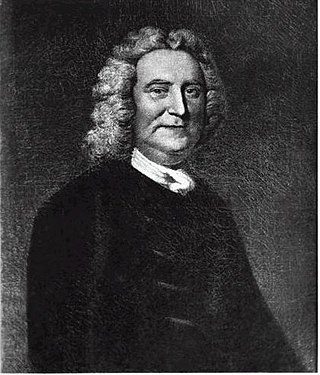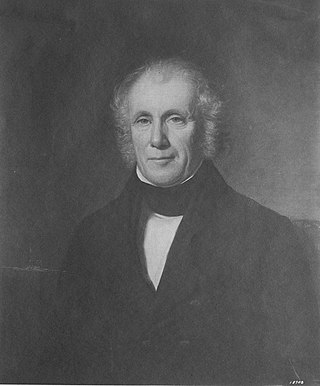Robert Livingston may refer to:

Robert Robert Livingston was an American lawyer, politician, and diplomat from New York, as well as a Founding Father of the United States. He was known as "The Chancellor" after the high New York state legal office he held for 25 years. He was a member of the Committee of Five that drafted the Declaration of Independence, along with Thomas Jefferson, Benjamin Franklin, John Adams, and Roger Sherman, but was recalled by the state of New York before he could sign the document. Livingston administered the oath of office to George Washington when he assumed the presidency April 30, 1789. Livingston was also elected as a member of the American Philosophical Society in 1801.
Robert Livingston was the third and final Lord of Livingston Manor and a member of the assembly for the manor from 1737 to 1790.

William Livingston was an American politician and lawyer who served as the first governor of New Jersey (1776–1790) during the American Revolutionary War. As a New Jersey representative in the Continental Congress, he signed the Continental Association and the United States Constitution. He is considered one of the Founding Fathers of the United States and a Founding Father of New Jersey.

Stephanus van Cortlandt was the first native-born mayor of New York City, a position which he held from 1677 to 1678 and from 1686 to 1688. He was the patroon of Van Cortlandt Manor and was on the governor's executive council from 1691 to 1700. He was the first resident of Sagtikos Manor in West Bay Shore on Long Island, which was built around 1697. A number of his descendants married English military leaders and Loyalists active in the American Revolution, and their descendants became prominent members of English society.

James Alexander was a Scottish-born lawyer and politician in colonial New York. He served in the Colonial Assembly and as attorney general of the colony in 1721–23. His son William was later a major general in the Continental Army during the American revolution. Alexandria Township, New Jersey was named after James Alexander.
Thomas Foley or Tom Foley may refer to:

Robert Robert Livingston, also called The Judge, was a prominent colonial American politician, and a leading Whig in New York in the years leading up to the American Revolution.
Livingston Manor was a 160,000-acre (65,000 ha) tract of land in the Province of New York granted to Robert Livingston the Elder during the reign of George I of Great Britain. Located between the Hudson River and the Massachusetts border, the Livingston Manor was located in an area that later became a portion of Columbia County in the state of New York.
Peter Robert Livingston was an American politician who served as the acting lieutenant governor of New York from February to October 1828.

The Schuyler family was a prominent Dutch family in New York and New Jersey in the 18th and 19th centuries, whose descendants played a critical role in the formation of the United States, in leading government and business in North America and served as leaders in business, military, politics, and society. The other two most influential New York dynasties of the 18th and 19th centuries were the Livingston family and the Clinton family.

The Van Cortlandt family was an influential political dynasty from the seventeenth-century Dutch origins of New York through its period as an English colony, then after it became a state, and into the nineteenth century. It rose to great prominence with the award of a Royal Charter to Van Cortlandt Manor, an 86,000-acre (35,000 ha) tract in today's Westchester County sprawling from the Hudson River to the Connecticut state line granted as a Patent to Stephanus Van Cortlandt in 1697 by King William III.

The Livingston family of New York is a prominent family that migrated from Scotland to the Dutch Republic, and then to the Province of New York in the 17th century. Descended from the 4th Lord Livingston, its members included signers of the United States Declaration of Independence and the United States Constitution. Several members were Lords of Livingston Manor and Clermont Manor, located along the Hudson River in 18th-century eastern New York.
Livingston is a surname with several different origins. The name itself originates in Scotland as a habitational name derived from Livingston in Lothian which was originally named in Middle English Levingston. This place name was originally named after a man named Levin who appears in several 12th-century charters. In Ireland, the name was adopted by people bearing the Gaelic surnames Ó Duinnshléibhe and Mac Duinnshléibhe. Livingston can also be an Americanized form of Lowenstein, a Jewish surname.

Maturin Livingston, a member of the prominent Livingston family, was an American lawyer and politician from New York.

The Beekman family is a family of Dutch descent that was prominent during the 17th, 18th, and 19th centuries in the area now known as the state of New York. Members of this family played a critical role in the formation of the United States and served as leaders in business, politics and society.
Senator Matthews may refer to:
Edward Livingston (1764–1836) was a U.S. Senator from Louisiana from 1829 to 1831. Senator Livingston may also refer to:
This page is based on this
Wikipedia article Text is available under the
CC BY-SA 4.0 license; additional terms may apply.
Images, videos and audio are available under their respective licenses.









